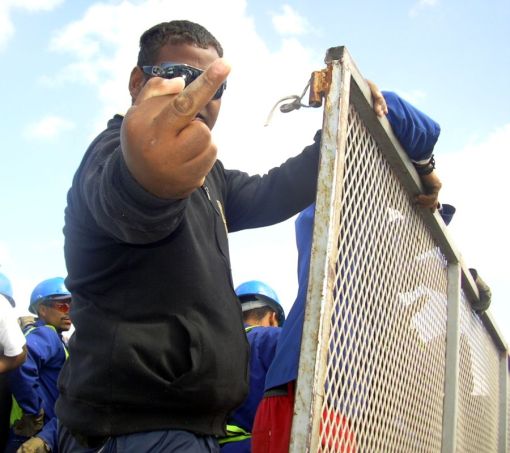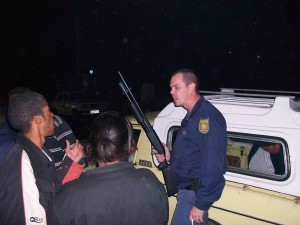Across the country, housing has become the single largest cause of conflict between the state and poor communities
by Imraan Buccus
Source: The Mercury
March 05, 2008 Edition 1
Last week shocking images of the police shooting at Cape Town’s poorest citizens were beamed around the world as the people of Delft were attacked. The damage to the city and the country caused by these images that looked like a flashback to the 1980s is incalculable.
South Africa once had a reputation as a haven of respect for human rights. People came from all over the world to learn from us. Those days are over. The atrocious rates of violence against women, xenophobia, threats to academic freedom, press freedom and the independence of the judiciary, not to mention the widespread corruption of the business and political elite, have robbed us of the moral high ground we briefly held after the negotiated transition.
The tragedy is that the disaster in Delft was widely predicted and could so easily have been avoided. Top-down planning with the aim of removing the poor from the city in advance of the 2010 World Cup had become almost farcical. The Western Cape provincial housing department decided to move 6 000 people from the Joe Slovo shack settlement near the airport (where tourists could see them) to Delft, 30km away, where they would be well hidden from tourists. But the people from Joe Slovo refused to accept forced removal to Delft and the people from Delft were furious that the houses built in their community and promised to them would now be forced on people from outside who didn’t want them. The people from Delft, with the full support of the people from Joe Slovo, occupied the houses in Delft.
The police were sent in to evict the occupiers violently. More than 20, including three children, ended up in hospital. But the police violence has hardly resolved the problem. People in Joe Slovo are still refusing the forced relocation and people in Delft are still homeless. All that has been achieved is that the Delft houses are now empty.
Global experience shows that developing countries need to dedicate between 6% and 10% of their national budgets to housing if they want to meet the needs of their people and avoid major social conflict.
The average developing country devotes 5% of its national budget to housing. Here in South Africa we are spending only 1.5% of the national purse on housing.
Every year the housing backlog grows. Moreover the houses that are being built are largely entrenching apartheid spatial segregation. The apartheid system was condemned for building bleak townships on the urban periphery. But post apartheid housing “delivery” continues to build bleak townships on the urban periphery rather than to develop integrated, compact, vibrant cities with open democratic public spaces like parks, sports and cultural facilities, libraries and so on.
It is therefore unsurprising that across the country housing has become the single largest cause of conflict between the state and poor communities. We have not been immune from this here in Durban. In November 2005 and again in September 2007 images of police shooting at shack dwellers in Clare Estate were also beamed around the world. It is common knowledge that Amnesty International and Human Rights Watch are both investigating human rights abuses in Durban.
A study of developing countries that have had to confront housing crises reveals three basic responses.
The high road begins with a recognition of the problem, followed by serious budgetary commitments and the creation of a genuine planning partnership between government and the poor. This is the route that cities such as Naga in the Philippines and Curitiba in Brazil have taken.
This kind of bottom-up development creates safe and just cities in which the whole population has a stake. It creates the foundation for genuinely inclusive and sustainable development.
The middle road is denial. Denial of a housing crisis is often accompanied by massive expenditure on prestige projects such as stadia, conference centres, waterfronts, international events and so on in the vain hope that these pockets of extravagance will detract from the poverty and misery slowly engulfing the city.
Baltimore and Cape Town are infamous examples of this approach. Investment in prestige projects and events does not trickle down to the poor and this approach inevitably leads to radically segregated cities with wealth and opulence on one side of the razor wire and poverty and desperation on the other. These cities will never be safe cities.
The low road is to stigmatise the poor and their housing solutions (often by calling them slums) as a threat to society and to make poverty a security issue. Harare is of course the most notorious contemporary example of this descent into what ultimately becomes a war against the poor.
In KwaZulu-Natal the passing of the Elimination of Slums Act last year was a clear indication that this is the direction that the provincial government is now looking towards.
In general South Africa seems to be veering between the middle road and the low road. We can only hope that the tragic events in Delft will be a wake-up call to the state and civil society.
If we do not begin to build just and inclusive cities our future will look a lot more like Delft - bleak, desperate and violent.
For years now the organisations of the poor have been warning us about the direction that our country is taking. We need to begin to listen. We need, fundamentally, to rethink the way we do things and we need to do it urgently.
The cost of continuing on the current path will be ruination. It is essential that we begin to build a society in which everyone has a meaningful stake, in which everyone has basic needs met and in which everyone can express views freely.
 Read the rest of this entry »
Read the rest of this entry »


 Stumble It!
Stumble It!